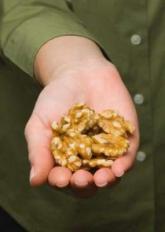ANAHEIM, CALIF. – Eating an ounce and a half of walnuts daily led to favorable changes in gut microbiome composition and diversity in a prospective randomized controlled trial, Klaus G. Parhofer, MD, reported at the American Heart Association scientific session.
These changes in intestinal flora may account for the reductions in LDL cholesterol, triglycerides, apolipoprotein B, and non-HDL cholesterol previously documented with walnut consumption in the same trial, according to Dr. Parhofer, professor of endocrinology and metabolism at the University of Munich.
The study included 204 healthy white men and women with a mean age of 63 years and a mean body mass index of 25.1 kg/m2, who were randomized to an 8-week diet that included 43 g of shelled walnuts per day or to an isocaloric nut-free control diet. Then, after a 4-week washout, participants crossed over to the other study arm. Stool samples were collected from 142 subjects at the end of each diet phase for microbiome analysis of bacterial ribosomal RNA.The gut microbiome composition during the walnut and control phases differed by about 5%. The proportion of the microbiome composed of probiotic and butyric acid–producing organisms in the phylum Bacteroidetes – especially Ruminococcacaeae and Bifidobacteria – increased during the walnut-eating phase, while the Clostridium cluster XIVa microorganisms in the genera Blautia and Anaerostipes decreased significantly, compared with the control diet.
“It is unclear whether these changes are preserved during longer walnut consumption and how these changes can be associated with the observed changes in lipid metabolism,” the endocrinologist noted.
An earlier report focused on the fasting lipid reductions seen in response to walnut consumption in the full study population. LDL cholesterol fell by an average of 7.4 mg/dL after 8 weeks of daily walnut consumption, compared with a 1.7-mg/dL reduction on the nut-free diet; triglycerides fell by 5.0 mg/dL, while increasing by 3.7 mg/dL on the control diet; non-HDL cholesterol declined by 10.3 mg/dL on the walnut diet and by a far more modest 1.4 mg/dL during the control phase; and apolipoprotein B dropped by 6.7 mg/dL compared with a 0.5 mg/dL reduction on the nut-free diet. All of these differences were statistically significant. However, levels of HDL and lipoprotein (a) weren’t affected.
The California Walnut Commission provided Dr. Parhofer with a research grant to conduct the trial.
bjancin@frontlinemedcom.com
